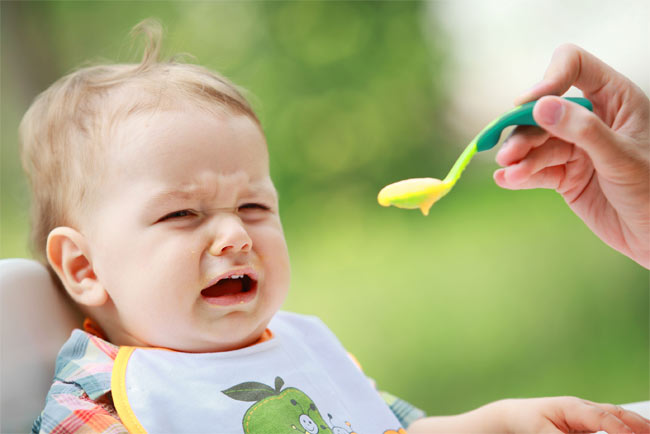Poor Formula: Fussy Babies Get Solid Food Too Early

The squeaky wheel really does get the grease, or in this case, the rice cereal: A new study finds that fussy babies get introduced to solid foods earlier than laid-back infants.
That's a problem, researchers report today (Jan.10) in the journal Pediatrics, because the early addition of solid foods and juice adds calories to a baby's diet. Previous research has linked these excess calories to higher weight and body mass index (BMI), a measure of weight per height, in infancy and toddlerhood.
A recent study found that, based on standardized growth curves, one-third of 9-month-olds and one-third of 2-year-olds are overweight for their height. While babies need to gain weight to survive and shouldn't be put on diets, doctors are becoming more concerned that early unhealthy habits will follow kids throughout their lifetimes.
"Moms are definitely giving kids a lot more to eat than just breast milk, which is the recommended thing up to three months," study author Barbara Goldman, a developmental psychologist at the Frank Porter Graham Child Development Institute at the University of North Carolina, told LiveScience. "What we're finding is that even if they're not breast-feeding and they're doing formula, they're doing formula plus other things very early."
Following low-income families
The researchers focused on low-income black families in North Carolina. Previous research suggested that this community is likely to feed babies solid foods before the recommended age, Goldman said. The prevalence of early childhood obesity in black children is 10.3 percent, compared with 12.5 percent in Hispanics and 8.7 percent in whites in the United States, according to studies published in 2002 and 2006 in the Journal of the American Medical Association.
Slightly more than 200 first-time moms were recruited through the North Carolina Supplemental Nutrition Program for Women, Infants and Children (WIC), a program that helps low-income families afford food. The researchers visited the families every three months at their homes from the time the infants were 3 months old until they were 12 months old. A final visit took place when the babies were 18 months old.
Sign up for the Live Science daily newsletter now
Get the world’s most fascinating discoveries delivered straight to your inbox.
At each visit, researchers asked moms to rate their baby's temperament. The mothers also reported what and how much their babies ate.
Early eaters
About 70 percent of babies got at least some breast milk in their first month of life, and a total of 20 percent got breast milk exclusively. However, those numbers dropped off quickly, with just 25 percent being breast-fed by 3 months of age. At 3 months old, only 5 percent of babies were getting exclusive breast-milk diets.
The American Association of Pediatrics (AAP) recommends that babies breast-feed exclusively until 4 months of age, and 6 months if possible. That can be difficult when moms have to work and babies have multiple caregivers, Goldman said. [Read: Why New Mothers Need Extra Attention]
The AAP also recommends that solid foods be introduced after four months, but in the North Carolina sample, nearly 20 percent of 1-month-olds were fed solid foods or juice. By three months, 70 percent of the children were eating something in addition to milk or formula. Often, parents gave kids fruit juice or added cereal to their bottles, Goldman said.
"It's possible that people are not appreciating how young baby's digestive systems really are," Goldman said. "They're really not designed for [solid] food."
More fussing, more food
The kids who rocked the boat were the most likely to get age-inappropriate food. Moms who described their kids as fussy were almost twice as likely to feed them solid food early compared with moms who said their babies were calm.
Moms who were themselves obese also fed babies more solid foods. Moms who showed symptoms of depression, on the other hand, gave babies more juice.
That's a sign that overwhelmed moms are turning to juice to soothe fussy infants, Goldman said.
"You can calm down babies by giving them juice," she said. "The downside of that is then you're teaching a kid really early on that if you're in trouble, go and eat something sweet."
Another downside is the excess calories. The infants who were fed formula plus solid food or juice consumed about 100 more calories a day than infants given only formula (or only breast milk).
"It's like getting a whole extra day's worth of food" over the course of a week, Goldman said. "That's a lot of extra food."
The solution, Goldman said, is to promote breast-feeding and remind parents that young babies don't need solids. It can be difficult, she said, but parents should try rocking a fussy baby or taking him or her for a walk instead of turning to juice and food for remedies.
"Part of it is just making sure that people appreciate that this might be nice in the short run, nice and easy, but it's not good in the long run for the baby," Goldman said.
- 8 Reasons Our Waistlines Are Expanding
- Extra Weight in Babies Can Be a Perilous Subject
- 7 Diet Tricks That Really Work
You can follow LiveScience Senior Writer Stephanie Pappas on Twitter @sipappas.

Stephanie Pappas is a contributing writer for Live Science, covering topics ranging from geoscience to archaeology to the human brain and behavior. She was previously a senior writer for Live Science but is now a freelancer based in Denver, Colorado, and regularly contributes to Scientific American and The Monitor, the monthly magazine of the American Psychological Association. Stephanie received a bachelor's degree in psychology from the University of South Carolina and a graduate certificate in science communication from the University of California, Santa Cruz.









